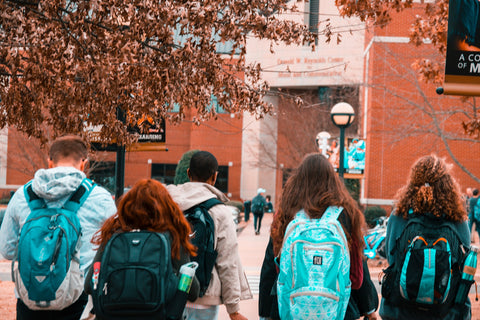Students and Sleep - What You Need To Know
Posted by Blue Block Glasses Team on July 28, 2019 . 0 Comments
Doctors in England have reported a sharp rise in children with sleep disorders
The conclusions come after a review of the National Health Service (NHS) data which shows that hospital attendances in England for under-14s have risen from almost 3,000 in 2005-06 to more than 8,000 in 2015-16 [1]. These disorders can range from Insomnia to Excessive Day-time sleepiness. For many people, this can be a problem as their lives during the day require them to be healthy and active.
For students in school, being sleepy or tired can often result in a mixture of sleep related issues; reduced ability to concentrate, increased irritability and poorer mood.

Why staying up later is not the best idea for students
Students often stay up late at night to prepare next days’ activities typically late into the night. With increased workloads and distractions, many students find themselves staying up later and later into the night. Most students don’t consider that going to sleep early on a regular basis is best in the long run.
An article from the Science and Society “The Rhythm of Rest and Excess” [2] has discussed that one of the main functions of the brain during Slow Wave Sleep (SWS) and enhanced during REM sleep is memory consolidation. Evidence from both animal and human studies indicates that there is a strong link between sleep and what has been termed ‘sleep-dependent memory processing’. Simply put - better sleep results in better concentration and consolidation of memories. Finally, they found that being sleep deprived after reviewing material has shown to have impaired performance in subsequent tests, and lower neurocognitive abilities [3].
For students, this means it’s harder for you to learn new material as it comes in – especially if you've been awake all night!
Hey students - put away your phones and laptops!
Sleeping in a luxury that few people have. Adults need to work and students need to go to school. With the increasing exposure and use of technology among children, students have become accustomed to staying up late at night play games, chat with friends and watch movies.
Just as you would prepare for a test, students would be better off forming a consistent healthy schedule. Time management is important – resisting the temptation to stay up late which disrupts your internal clock leading to repercussions later in the week. Sleeping at the same time every night helps form this healthy routine, as well as reducing your exposure to noise before bed and early in the morning to ease your body’s start up and slow down process.
What can parents, schools and communities do to better students sleep?
What parents, schools, and communities can do to help is promoting such behaviors. Promote healthy behaviors as you would punish bad behaviors. In a clinical review “Understanding Adolescent’s Sleep Patterns and School Performance: A Critical Appraisal” [4], researchers looked at sleep/wake patterns, school start times, and classroom performance. Their findings strongly indicated that self-reported shortened sleep time, erratic sleep/wake schedules were negatively associated with academic performance among adolescents in middle school through college. Therefore, allowing adolescents to develop healthy schedules and allowing more time to sleep will allow them to mature, grow, and learn appropriately. Some schools have even gone as far as delaying the school start times, as theirs were respectively too early – much earlier than work shift start times among adults. The environments that children grow up in, is main factor to their performance in their school and work life – let’s make this environment conducive to their potential.
References:
[1] https://www.theguardian.com/education/2017/mar/29/children-struggling-concentrate-school-lack-of-sleep-deprivation-mental-health, Akerstedt T, Gillberg M. 1990 Subjective and objective sleepiness in the active individual. Int. J. Neurosci. 52, 29–37.
[2] Foster, Russell G., and Katharina Wulff. "Science and society: The rhythm of rest and excess." Nature Reviews Neuroscience6.5 (2005): 407-14. Web.
[3] "Sleep loss, learning capacity and academic performance." Sleep loss, learning capacity and academic performance - ScienceDirect. N.p., n.d. Web. 11 July 2017.
[4] "Understanding adolescent's sleep patterns and school performance: a critical appraisal." Understanding adolescent's sleep patterns and school performance: a critical appraisal - ScienceDirect. N.p., n.d. Web. 11 July 2017

Post Comment.